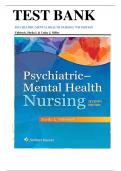TEST BANK
PSYCHIATRIC-MENTAL HEALTH NURSING 7TH EDITION
Videbeck, Sheila L & Cathy J. Miller
,TEST BANK FOR PSYCHIATRIC MENTAL HEALTH NURSING 7TH EDITION BY VIDEBECK
TEST BANK FOR PSYCHIATRIC
MENTAL HEALTH NURSING 7TH
EDITION BY VIDEBECK
Psychiatric Mental Health Nursing 7th EditionTest Bank
Chapter 1
1. The nurse is assessing the factors contributing to the well-being of a newly admitted
client. Which of the following would the nurse identify as having a positive impact
on the individual's mental health?
A) Not needingothers for companionship
B) The ability to effectivelymanage stress
C) Afamily history of mental illness
D) Striving fortotal self-reliance
Ans: B
Feedback:
Individual factors influencing mental health include biologic makeup, autonomy,
independence, self-esteem, capacity for growth, vitality, ability to find meaning in life,
emotional resilience or hardiness, sense of belonging, reality orientation, and coping or
stress management abilities. Interpersonal factors such as intimacy and a balance of
separateness and connectedness are bothneeded forgoodmental health, and therefore a
healthy person would need others for companionship. A family history of mental
illness couldrelate to the biologic makeup of an individual, whichmay have a negative
impact on an individual's mental health, as well as a negative impact on an individual's
interpersonal and socialñcultural factors of health. Total self-reliance is not possible,
and a positive social/cultural factor is access to adequate resources.
2. Which of the following statements about mental illness are true? Select all that apply.
A) Mental illness cancausesignificant distress, impaired functioning, or both.
B) Mentalillness is only due to social/cultural factors.
C) Social/cultural factors that relate to mental illness include excessive dependency
on or withdrawal from relationships.
D) Individualssuffering from mental illness are usually able to cope effectively with
daily life.
E) Individualssuffering from mental illness may experiencedissatisfaction with
TEST BANK FOR PSYCHIATRIC MENTAL HEALTH NURSING 7TH EDITION BY VIDEBECK
,TEST BANK FOR PSYCHIATRIC MENTAL HEALTH NURSING 7TH EDITION BY VIDEBECK
relationships and self.
Ans: A, D, E
Feedback:
Mental illness can cause significant distress, impaired functioning, or both. Mental
illness may be related to individual, interpersonal, or social/cultural factors. Excessive
dependency on or withdrawal from relationships are interpersonal factors that relate to
mental illness. Individuals suffering from mental illness can feel overwhelmed with
daily life. Individuals suffering from mental illness may experience dissatisfaction with
relationships and self.
Page 1
TEST BANK FOR PSYCHIATRIC MENTAL HEALTH NURSING 7TH EDITION BY VIDEBECK
, TEST BANK FOR PSYCHIATRIC MENTAL HEALTH NURSING 7TH EDITION BY VIDEBECK
3. Which of the following are true regarding mentalhealth andmental illness?
A) Behavior that may be viewed as acceptable in one culture is always
unacceptable in other cultures.
B) It is easy to determine if a person is mentally healthy or mentally ill.
C) In most cases, mental health is a state of emotional, psychological, and social
wellness evidenced by satisfying interpersonal relationships, effective behavior
and coping, positive self-concept, and emotional stability.
D) Persons who engagein fantasies are mentally
ill. Ans: C
Feedback:
What one society may view as acceptable and appropriate behavior, another society may
see that as maladaptive, and inappropriate. Mental health and mental illness are difficult
to define precisely. In most cases, mental health is a state of emotional, psychological,
and social wellness evidenced by satisfying interpersonal relationships, effective
behavior and coping, positive self-concept, and emotional stability. Persons who engage
in fantasiesmay be mentally healthy, but the inability to distinguishreality from fantasyis
an individual factor that may contribute to mental illness.
4. A client grieving the recent loss of her husband asks if she is becoming mentally
ill because she is so sad. The nurse's best response would be,
A) ìYou may have a temporary mental illness because you are experiencing so much
pain.î
B) ìYouare not mentally ill. This is an expected reaction to the loss you have
experienced.î
C) ìWere you generally dissatisfied with your relationship before your husband's
death?î
D) ìTrynot to worry about that right now. You never know what the future brings.î
Ans: B
Feedback:
Mental illness includes general dissatisfaction with self, ineffective relationships,
ineffective coping, and lack of personal growth. Additionally the behavior must not be
culturally expected. Acute grief reactions are expected and therefore not considered
mentalillness. False reassurance or overanalysis does not accurately address the client's
concerns.
TEST BANK FOR PSYCHIATRIC MENTAL HEALTH NURSING 7TH EDITION BY VIDEBECK




